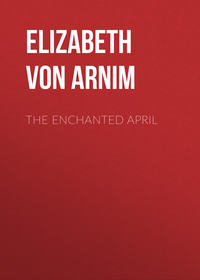 полная версия
полная версияIn the Mountains
Ridiculous, hateful and ridiculous, to be so little master of one's own body that one has to look on helplessly at one's hands shaking.
I want to forget. I don't want to be reminded. It is my one chance of safety, my one hope of escape. To forget—forget till I have got my soul safe back again, really my own again, no longer a half destroyed thing. I call it my soul. I don't know what it is. I am very miserable.
It is details that I find so difficult to bear. As long as in my mind everything is one great, unhappy blur, there is a chance of quietness, of gradual creeping back to peace. But details remind me too acutely, flash back old anguish too sharply focussed. I oughtn't to have opened the letters till I was by myself. But it pleased me so much to get them. I love getting letters. They were in the handwriting of friends. How could I guess, when I saw them on the breakfast-table, that they would innocently be so full of hurt? And when I had read them, and I picked up my cup and tried to look as if nothing had happened and I were drinking coffee like anybody else, my silly hand shook so much that Dolly noticed it.
Our eyes met.
I couldn't get that wretched cup back on to its saucer again without spilling the coffee. If that is how I still behave, what has been the good of being here? What has the time been but wasted? What has the cure been but a failure?
I have come up to my room. I can't stay downstairs. It would be unbearable this morning to sit and be read to. But I must try to think of an excuse, quickly. Mrs. Barnes may be up any minute to ask—oh, I am hunted!
It is a comfort to write this. To write does make one in some strange way less lonely. Yet—having to go and look at oneself in the glass for companionship,—isn't that to have reached the very bottom level of loneliness?
Evening.
The direct result of those letters has been to bring Dolly and me at last together.
She came down to the kitchen-garden after me, where I went this morning when I had succeeded in straightening myself out a little. On the way I told Mrs. Barnes, with as tranquil a face as I could manage, that I had arrangements to discuss with Antoine, and so, I was afraid, would for once miss the reading.
Antoine I knew was working in the kitchen-garden, a plot of ground hidden from the house at the foot of a steep descent, and I went to him and asked to be allowed to help. I said I would do anything,—dig, weed, collect slugs, anything at all, but he must let me work. Work with my hands out of doors was the only thing I felt I could bear to-day. It wasn't the first time, I reflected, that peace has been found among cabbages.
Antoine demurred, of course, but did at last consent to let me pick red currants. That was an easy task, and useful as well, for it would save Lisette the assistant's time, who would otherwise presently have to pick them. So I chose the bushes nearest to where he was digging, because I wanted to be near some one who neither talked nor noticed, some one alive, some one kind and good who wouldn't look at me, and I began to pick these strange belated fruits, finished and forgotten two months ago in the valley.
Then I saw Dolly coming down the steps cut in the turf. She was holding up her long black skirt. She had nothing on her head, and the sun shone in her eyes and made her screw them up as she stood still for a moment on the bottom step searching for me. I saw all this, though I was stooping over the bushes.
Then she came and stood beside me.
'You oughtn't to be here,' I said, going on picking and not looking at her.
'I know,' said Dolly.
'Then hadn't you better go back?'
'Yes. But I'm not going to.'
I picked in silence.
'You've been crying,' was what she said next.
'No,' I said.
'Perhaps not with your eyes, but you have with your heart.'
At this I felt very much like Mrs. Barnes; very much like what Mrs. Barnes must have felt when I tried to get her to be frank.
'Do you know what your sister said to me the other day?' I asked, busily picking. 'She said she has a great opinion of discretion.'
'Yes,' said Dolly. 'But I haven't.'
'And I haven't either,' I was forced to admit.
'Well then,' said Dolly.
I straightened myself, and we looked at each other. Her eyes have a kind of sweet radiance. Siegfried must have been pleased when he saw her coming down the sheet into his arms.
'You mustn't tell me anything you don't quite want to,' said Dolly, her sweet eyes smiling, 'but I couldn't see you looking so unhappy and not come and—well, stroke you.'
'There isn't anything to tell,' I said, comforted by the mere idea of being stroked.
'Yes there is.'
'Not really. It's only that once—oh well, what's the good? I don't want to think of it—I want to forget.'
Dolly nodded. 'Yes,' she said. 'Yes.'
'You see I came here to get cured by forgetting, and I thought I was cured. And this morning I found I wasn't, and it has—and it has disappointed me.'
'You musn't cry, you know,' said Dolly gently. 'Not in the middle of picking red currants. There's the man—'
She glanced at Antoine, digging.
I snuffled away my tears without the betrayal of a pocket handkerchief, and managed to smile at her.
'What idiots we go on being,' I said ruefully.
'Oh—idiots!'
Dolly made a gesture as of including the whole world.
'Does one ever grow up?' I asked.
'I don't know. I haven't.'
'But do you think one ever learns to bear pain without wanting to run crying bitterly to one's mother?'
'I think it's difficult. It seems to take more time,' she added smiling, 'than I've yet had, and I'm forty. You know I'm forty?'
'Yes. That is, I've been told so, but it hasn't been proved.'
'Oh, I never could prove anything,' said Dolly.
Then she put on an air of determination that would have alarmed Mrs. Barnes, and said, 'There are several other things that I am that you don't know, and as I'm here alone with you at last I may as well tell you what they are. In fact I'm not going away from these currant bushes till I have told you.'
'Then,' I said, 'hadn't you better help me with the currants while you tell?' And I lifted the basket across and put it on the ground between us.
Already I felt better. Comforted, cheered by Dolly's mere presence and the sweet understanding that seems to shine out from her.
She turned up her sleeves and plunged her arms into the currant bushes. Luckily currants don't have thorns, for if it had been a gooseberry bush she would have plunged her bare arms in just the same.
'You have asked us to stay on,' she began, 'and it isn't fair that you shouldn't know exactly what you are in for.'
'If you're going to tell, me how your name is spelt,' I said, 'I've guessed that already. It is Juchs.'
'Oh, you're clever!' exclaimed Dolly unexpectedly.
'Well, if that's clever,' I said modestly, 'I don't know what you would say to some of the things I think of.'
Dolly laughed. Then she looked serious again, and tugged at the currants in a way that wasn't very good for the bush.
'Yes. His name was Juchs,' she said. 'Kitty always did pronounce it Jewks. It wasn't the war. It wasn't camouflage. She thought it was the way. So did the other relations in England. That is when they pronounced it at all, which I should think wasn't ever.'
'You mean they called him Siegfried,' I said.
Dolly stopped short in her picking to look at me in surprise. 'Siegfried?' she repeated, her arrested hands full of currants.
'That's another of the things I've guessed,' I said proudly. 'By sheer intelligently putting two and two together.'
'He wasn't Siegfried,' said Dolly.
'Not Siegfried?'
It was my turn to stop picking and look surprised.
'And in your sleep—? And so affectionately—?' I said.
'Siegfried wasn't Juchs, he was Bretterstangel,' said Dolly. 'Did I say his name that day in my sleep? Dear Siegfried.' And her eyes, even while they rested on mine became softly reminiscent.
'But Dolly—if Siegfried wasn't your husband, ought you to have—well, do you think it was wise to be dreaming of him?'
'But he was my husband.'
I stared.
'But you said your husband was Juchs,' I said.
'So he was,' said Dolly.
'He was? Then why—I'm fearfully slow, I know, but do tell me—if Juchs was your husband why wasn't he called Siegfried?'
'Because Siegfried's name was Bretterstangel. I began with Siegfried.'
There was a silence. We stood looking at each other, our hands full of currants.
Then I said, 'Oh.' And after a moment I said, 'I see.' And after another moment I said, 'You began with Siegfried.'
I was greatly taken aback. The guesses which had been arranged so neatly in my mind were swept into confusion.
'What you've got to realise,' said Dolly, evidently with an effort, 'is that I kept on marrying Germans. I ought to have left off at Siegfried. I wish now I had. But one gets into a habit—'
'But,' I interrupted, my mouth I think rather open, 'you kept on—?'
'Yes,' said Dolly, holding herself very straight and defiantly, 'I did keep on, and that's what I want you to be quite clear about before we settle down to stay here indefinitely. Kitty can't stay if I won't. I do put my foot down sometimes, and I would about this. Poor darling—she feels desperately what I've done, and I try to help her to keep it quiet with ordinary people as much as I can—oh, I'm always letting little bits out! But I can't, I won't, not tell a friend who so wonderfully invites us—'
'You're not going to begin being grateful?' I interrupted quickly.
'You've no idea,' Dolly answered irrelevantly, her eyes wide with wonder at her past self, 'how difficult it is not to marry Germans once you've begun.'
'But—how many?' I got out.
'Oh, only two. It wasn't their number so much. It was their quality.'
'What—Junkers?'
'Junkers? Would you mind more if they had been? Do you mind very much anyhow?'
'I don't mind anything. I don't mind your being technically German a scrap. All I think is that it was a little—well, perhaps a little excessive to marry another German when you had done it once already. But then I'm always rather on the side of frugality. I do definitely prefer the few instead of the many and the little instead of the much.'
'In husbands as well?'
'Well yes—I think so.'
Dolly sighed.
'I wish I had been like that,' she said. 'It would have saved poor Kitty so much.'
She dropped the currants she held in her hands slowly bunch by bunch into the basket.
'But I don't see,' I said, 'what difference it could make to Kitty. I mean, once you had started having German husbands at all, what did it matter one more or less? And wasn't the second one d—I mean, hadn't he left off being alive when the war began? So I don't see what difference it could make to Kitty.'
'But that's just what you've got to realise,' said Dolly, letting the last bunch of currants drop out of her hand into the basket.
She looked at me, and I became aware that she was slowly turning red. A very delicate flush was slowly spreading over her face, so delicate that for a moment I didn't see what it was that was making her look more and more guilty, more and more like a child who has got to confess—but an honourable, good child, determined that it will confess.
'You know,' she said, 'that I've lived in Germany for years and years.'
'Yes,' I said. 'I've guessed that.'
'And it's different from England.'
'Yes,' I said. 'So I understand.'
'The way they see things. Their laws.'
'Yes,' I said.
Dolly was finding it difficult to say what she had to say. I thought it might help her if I didn't look at her, so I once more began to pick currants. She mechanically followed my example.
'Kitty,' she said, as we both stooped busily over the same bush, 'thinks what I did too dreadful. So did all our English relations. It's because you may think so too that I've got to tell you. Then you can decide whether you really want me here or not.'
'Dear Dolly,' I murmured, 'don't please make my blood run cold—'
'Ah, but it's forbidden in the Prayer Book.'
'What is?'
'What I did.'
'What did you do, Dolly?' I asked, now thoroughly uneasy; had her recklessness gone so far as to lead her to tamper with the Commandments?
Dolly tore off currants and leaves in handfuls and flung them together into the basket. 'I married my uncle,' she said.
'What?' I said, really astonished.
'Karl—that was my second husband—was Siegfried's—that was my first husband's—uncle. He was Siegfried's mother's brother—my first mother-in-law's brother. My second mother-in-law was my first husband's grandmother. In Germany you can. In Germany you do. But it's forbidden in the English Prayer Book. It's put in the Table of Kindred and Affinity that you mustn't. It's number nine of the right-hand column—Husband's Mother's Brother. And Kitty well, you can guess what Kitty has felt about it. If it had been my own uncle, my own mother's brother, she couldn't have been more horrified and heartbroken. I didn't realise. I didn't think of the effect it might have on them at home. I just did it. They didn't know till I had done it. I always think it saves bother to marry first and tell afterwards. I had been so many years in Germany. It seemed quite natural. I simply stayed on in the family. It was really habit.'
She threw some currants into the basket, then faced me. 'There,' she said, looking me straight in the eyes, 'I've told you, and if you think me impossible I'll go.'
'But—' I began.
Her face was definitely flushed now, and her eyes very bright.
'Oh, I'd be sorry, sorry,' she said impetuously, 'if this ended us!'
'Us?'
'You and me. But I couldn't stay here and not tell you, could I. Just because you may hate it so I had to tell you. You've got a dean in your family. The Prayer Book is in your blood. And if you do hate it I shall understand perfectly, and I'll go away and take Kitty and you need never see or hear of me again, so you musn't mind saying—'
'Oh do wait a minute!' I cried. 'I don't hate it. I don't mind. I'd only hate it and mind if it was I who had to marry a German uncle. I can't imagine why anybody should ever want to marry uncles anyhow, but if they do, and they're not blood-uncles, and it's the custom of the country, why not? You'll stay here, Dolly. I won't let you go. I don't care if you've married fifty German uncles. I've loved you from the moment I saw you on the top of the wall in your funny petticoat. Why, you don't suppose,' I finished, suddenly magnificently British, 'that I'm going to let any mere German come between you and me?'
Whereupon we kissed each other,—not once, but several times; fell, indeed, upon each other's necks. And Antoine, coming to fetch the red currants for Lisette who had been making signs to him from the steps for some time past, stood waiting quietly till we should have done.
When he thought we had done he stepped forward and said, 'Pardon, mesdames'—and stooping down deftly extracted the basket from between us.
As he did so his eye rested an instant on the stripped and broken branches of the currant bush.
He wasn't surprised.
September 7th.
I couldn't finish about yesterday last night. When I had got as far as Antoine and the basket I looked at the little clock on my writing-table and saw to my horror that it was nearly twelve. So I fled into bed; for what would Mrs. Barnes have said if she had seen me burning the electric light and doing what she calls trying my eyes at such an hour? It doesn't matter that they are my eyes and my light: Mrs. Barnes has become, by virtue of her troubles, the secret standard of my behaviour. She is like the eye of God to me now,—in every place. And my desire to please her and make her happy has increased a hundredfold since Dolly and I have at last, in spite of her precautions, become real friends.
We decided before we left the kitchen-garden yesterday that this was the important thing: to keep Mrs. Barnes from any hurt that we can avoid. She has had so many. She will have so many more. I understand now Dolly's deep sense of all her poor Kitty has given up and endured for her sake, and I understand the shackles these sacrifices have put on Dolly. It is a terrible burden to be very much loved. If Dolly were of a less naturally serene temperament she would go under beneath the weight, she would be, after five years of it, a colourless, meek thing.
We agreed that Mrs. Barnes musn't know that I know about Dolly's marriages. Dolly said roundly that it would kill her. Mrs. Barnes regards her misguided sister as having committed a crime. It is forbidden in the Prayer Book. She brushes aside the possible Prayer Books of other countries. Therefore the word German shall never I hope again escape me while she is here, nor will I talk of husbands, and perhaps it will be as well to avoid mentioning uncles. Dear me, how very watchful I shall have to be. For the first time in his life the Dean has become unmentionable.
I am writing this before breakfast. I haven't seen Dolly alone again since the kitchen-garden. I don't know how she contrived to appease Mrs. Barnes and explain her long absence, but that she did contrive it was evident from the harmonious picture I beheld when, half an hour later, I too went back to the house. They were sitting together in the sun just outside the front door knitting. Mrs. Barnes's face was quite contented. Dolly looked specially radiant. I believe she is made up entirely of love and laughter—dangerous, endearing ingredients! We just looked at each other as I came out of the house. It is the most comforting, the warmest thing, this unexpected finding of a completely understanding friend.
September 10th.
Once you have achieved complete understanding with anybody it isn't necessary, I know, to talk much. I have been told this by the wise. They have said mere knowledge that the understanding is there is enough. They have said that perfect understanding needs no expression, that the perfect intercourse is without words. That may be; but I want to talk. Not excessively, but sometimes. Speech does add grace and satisfaction to friendship. It may not be necessary, but it is very agreeable.
As far as I can see I am never, except by the rarest chance, going to get an opportunity of talking to Dolly alone. And there are so many things I want to ask her. Were her experiences all pleasant? Or is it her gay, indomitable spirit that has left her, after them, so entirely unmarked? Anyhow the last five years can't possibly have been pleasant, and yet they've not left the shadow of a stain on her serenity. I feel that she would think very sanely about anything her bright mind touched. There is something disinfecting about Dolly. I believe she would disinfect me of the last dregs of morbidness I still may have lurking inside me.
She and Mrs. Barnes are utterly poor. When the war began Dolly was in Germany, she told me that morning in the kitchen-garden, and had been a widow nearly a year. Not Siegfried's widow: Juchs's. I find her widowhoods confusing.
'Didn't you ever have a child, Dolly?' I asked.
'No,' she said.
'Then how is it you twitched the handkerchief off your sister's sleeping face that first day and said Peep bo to her so professionally?'
'I used to do that to Siegfried. We were both quite young to begin with, and played silly games.'
'I see,' I said. 'Go on.'
Juchs had left her some money; just enough to live on. Siegfried hadn't ever had any, except what he earned as a clerk in a bank, but Juchs had had some. She hadn't married Juchs for any reason, I gathered, except to please him. It did please him very much, she said, and I can quite imagine it. Siegfried too had been pleased in his day. 'I seem to have a gift for pleasing Germans,' she remarked, smiling. 'They were both very kind to me. I ended by being very fond of them both. I believe I'd be fond of anyone who was kind. There's a good deal of the dog about me.'
Directly the war began she packed up and came to Switzerland; she didn't wish, under such circumstances, to risk pleasing any more Germans. Since her marriage to Juchs all her English relations except Kitty had cast her off, so that only a neutral country was open to her, and Kitty instantly gave up everybody and everything to come and be with her. At first her little income was sent to her by her German bank, but after the first few months it sent no more, and she became entirely dependent on Kitty. All that Kitty had was what she got from selling her house. The Germans, Dolly said, would send no money out of the country. Though the war was over she could get nothing out of them unless she went back. She would never go back. It would kill Kitty; and she too, she thought, would very likely die. Her career of pleasing Germans does seem to be definitely over.
'So you see,' she said smiling, 'how wonderful it is for us to have found you.'
'What I can't get over,' I said, 'is having found you.'
But I wish, having found her, I might sometimes talk to her.
September 12th.
We live here in an atmosphere of combats de générosité. It is tremendous. Mrs. Barnes and I are always doing things we don't want to do because we suppose it is what is going to make the other one happy. The tyranny of unselfishness! I can hardly breathe.
September 19th.
I think it isn't good for women to be shut up too long alone together without a man. They seem to fester. Even the noblest. Taking our intentions all round they really are quite noble. We do only want to develope in ideal directions, and remove what we think are the obstacles to this development in each other's paths; and yet we fester. Not Dolly. Nothing ever smudges her equable, clear wholesomeness; but there are moments when I feel as if Mrs. Barnes and I got much mixed up together in a sort of sticky mass. Faint struggles from time to time, brief efforts at extrication, show there is still a life in me that is not flawlessly benevolent, but I repent of them as soon as made because of the pain and surprise that instantly appear in Mrs. Barnes's tired, pathetic eyes, and hastily I engulf myself once more in goodness.
That's why I haven't written lately, not for a whole week. It is glutinous, the prevailing goodness. I have stuck. I have felt as though my mind were steeped in treacle. Then to-day I remembered my old age, and the old lady waiting at the end of the years who will want to be amused, so I've begun again. I have an idea that what will really most amuse that old lady, that wrinkled philosophical old thing, will be all the times when I was being uncomfortable. She will be so very comfortable herself, so done with everything, so entirely an impartial looker-on, that the rebellions and contortions and woes of the creature who used to be herself will only make her laugh. She will be blithe in her security. Besides, she will know the sequel, she will know what came next, and will see, I daresay, how vain the expense of trouble and emotions was. So that naturally she will laugh. 'You silly little thing!' I can imagine her exclaiming, 'If only you had known how it all wasn't going to matter!' And she will laugh very heartily; for I am sure she will be a gay old lady.
But what we really want here now is an occasional breath of brutality,—the passage, infrequent and not too much prolonged, of a man. If he came to tea once in a way it would do. He would be a blast of fresh air. He would be like opening a window. We have minced about among solicitudes and delicacies so very long. I want to smell the rankness of a pipe, and see the cushions thrown anyhow. I want to see somebody who doesn't knit. I want to hear Mrs. Barnes being contradicted. Especially do I want to hear Mrs. Barnes being contradicted … oh, I'm afraid I'm still not very good!
September 20th.
The grapes are ripe down in the vineyards along the edge of the valley, and this morning I proposed that we should start off early and spend the day among them doing a grape-cure.
Mrs. Barnes liked the idea very much, and sandwiches were ordered, for we were not to come back till evening; then at the last moment she thought it would be too hot in the valley, and that her head, which has been aching lately, might get worse. The sandwiches were ready on the hall table. Dolly and I were ready too, boots on and sticks in hand. To our great surprise Mrs. Barnes, contemplating the sandwiches, said that as they had been cut they mustn't be wasted, and therefore we had better go without her.









